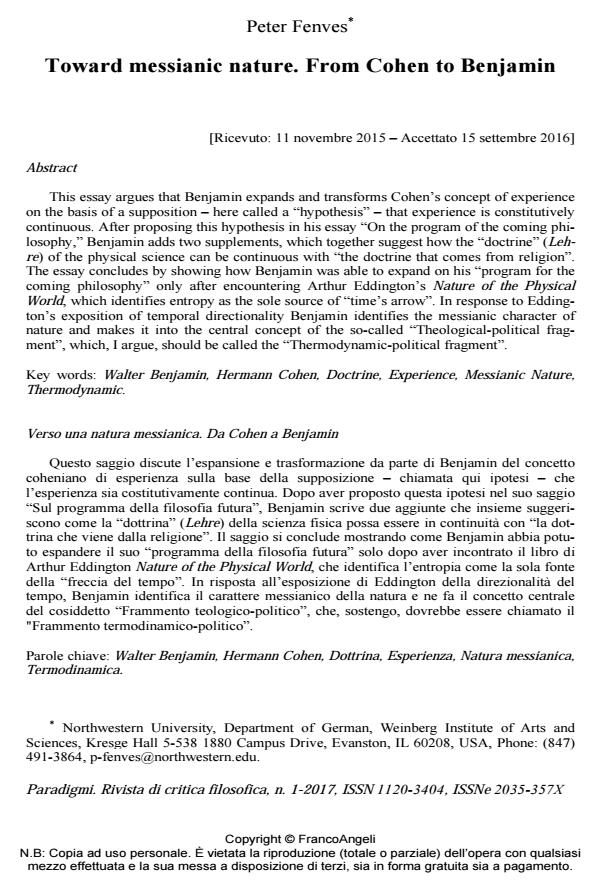Toward messianic nature. From Cohen to Benjamin
Journal title PARADIGMI
Author/s Peter Fenves
Publishing Year 2017 Issue 2017/1
Language English Pages 13 P. 13-25 File size 185 KB
DOI 10.3280/PARA2017-001002
DOI is like a bar code for intellectual property: to have more infomation
click here
Below, you can see the article first page
If you want to buy this article in PDF format, you can do it, following the instructions to buy download credits

FrancoAngeli is member of Publishers International Linking Association, Inc (PILA), a not-for-profit association which run the CrossRef service enabling links to and from online scholarly content.
This essay argues that Benjamin expands and transforms Cohen’s concept of experience on the basis of a supposition ? here called a "hypothesis" ? that experience is constitutively continuous. After proposing this hypothesis in his essay "On the program of the coming philosophy", Benjamin adds two supplements, which together suggest how the "doctrine" (Lehre) of the physical science can be continuous with "the doctrine that comes from religion". The essay concludes by showing how Benjamin was able to expand on his "program for the coming philosophy" only after encountering Arthur Eddington’s Nature of the Physical World, which identifies entropy as the sole source of "time’s arrow". In response to Eddington’s exposition of temporal directionality Benjamin identifies the messianic character of nature and makes it into the central concept of the so-called "Theological-political fragment", which, I argue, should be called the "Thermodynamic-political fragment".�
Keywords: Walter Benjamin, Hermann Cohen, Doctrine, Experience, Messianic Nature, Thermodynamic.
- Benjamin W. (1995-2000). Gesammelte Briefe, hrsg. von C. Gödde und H. Lonitz, Frankfurt a. M.: Suhrkamp Verlag.
- Benjamin W. (1972-91). Gesammelte Schriften, hrsg. von R. Tiedemann und H. Schweppenhäuser, Frankfurt a. M.: Suhrkamp Verlag.
- Cassirer E. (1910). Substanzbegriff und Funktionsbegriff: Untersuchungen über die Grundfragen der Erkenntniskritik. Berlin: Cassirer Verlag.
- Cassirer E. (1921). Zur Einstein’schen Relativitätstheorie: Erkenntnistheoretische Betrachtungen. Berlin: Cassirer Verlag.
- Cohen H. (2005). Werke, hrsg. von Hermann-Cohen Archiv under the Guidance of H. Holzey. Hildesheim-Zürich-New York: Olms Verlag.
- Cohen H. (1928). Schriften zur Philosophie und Zeitgeschichte, hrsg. von E. Cassirer und A. Görland, Berlin: Akademie Verlag.
- Eddington A. (1929). The Nature of Physical World. New York: MacMillan (German transl.: Das Weltbild der Physik und ein Versuch seiner philosophischen Deutung. Braunschweig: Vieweg & Sohn Verlag, 1931).
- Fenves P. (2011). The Messianic Reduction: Walter Benjamin and the Shape of Time. Stanford: Stanford University Press.
- Hertz H. (1894). Prinzipien der Mechanik in neuem Zusammenhang dargestellt. Leipzig: Barth Verlag.
- Kant I. (1900- ). Gesammelte Schriften, hrsg. von Königlich Preußische [later, Deutsche] Akademie der Wissenschaften. Berlin: Reimer [later, de Gruyter] Verlag.
- Nietzsche F. (1980). Sämtliche Werke. Kritische Studienausgabe, hrsg. von G. Colli und M. Montinari, Berlin: de Gruyter Verlag.
- Reichenbach H. (1956). The Direction of Time, ed. by M. Reichenbach. Berkeley: University of California Press.
- Lógica de la violencia. Los antagonismos cardinales de Walter Benjamin Federico Rodríguez, in Enrahonar. An international journal of theoretical and practical reason /2024 pp.157
DOI: 10.5565/rev/enrahonar.1510
Peter Fenves, Toward messianic nature. From Cohen to Benjamin in "PARADIGMI" 1/2017, pp 13-25, DOI: 10.3280/PARA2017-001002